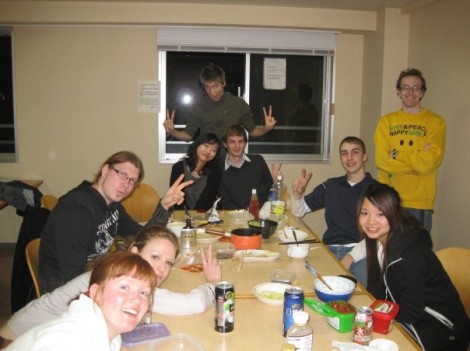A few years ago, I spent a year abroad in Japan and lived in a student dorm. Like any student residence, the majority of students were foreign, from a range of different countries. There were Russians, Malaysians, Americans, Canadians, a couple of Germans and lots of Koreans; all in all, a vibrant little international community.
One of the Canadian girls hit on a great idea – why not have an “international hot-pot.” This basically means that once a week, everyone makes a traditional dish from their own country and brings it along to a room, where everybody can share what’s on offer.
Aside from being interesting from a culinary perspective, imagine how this helped people to improve their language skills.
In that one gathering that happened weekly, people learned about different cultures in an atmosphere which made learning so easy. One of the Americans learned their first words in Korean and decided to go to Korea on an exchange not too long after getting back from Japan. I was able to recover a little of my French skills (I can order a Sub in Paris now  ) and most of the non-native English speakers really progressed quickly through the meetings.
) and most of the non-native English speakers really progressed quickly through the meetings.
This is a really nice entry point for anyone looking to set up face-to-face classes. The atmosphere is welcoming and the fact that everyone brings a traditional dish along means that conversation comes easy. “What’s that you’ve got there? Russian borsch? How do you make that? It’s delicious.” Just make sure people cook something different. Nobody wants an international hot-pot with seven identical dishes!

Cooking the meals together is even more fun and you have some great food to look forward to. You learn the vocabulary related to the kitchen and it’s always interesting to see how people from different cultures cook and season their food.
Knowing basic kitchen vocabulary can be really convenient if you’re invited to eat someplace or cook together.
When I was in Japan I hung out with the French people a lot and we got invited over to a Japanese family to cook something European. We ended up making Crêpe, which was thoroughly enjoyed by everyone. We didn’t know that much vocabulary in the kitchen, but we did manage to get by ;).
These informal get-togethers always left us with a feeling that we learned quite a bit. There is always some expression, an idiom or phrase you take away that you can use in a lot of situations. If you don’t have the pressure of a classroom, you can also just play around with the language.
A cooking get-together will be the first event we’re hosting at Language by Doing and if you’d like to join in, sign up for the newsletter on the left sidebar and we’ll keep you posted. Feel free to spread the love using the social media buttons below.
Leave a Reply